Planning and Delivering an AI Product Launch Event Report
VerifiedAdded on 2022/11/25
|14
|3785
|30
Report
AI Summary
This report provides a comprehensive overview of planning and delivering a product launch event centered around an AI-powered food delivery app. It begins by outlining the event cycle, including research, design, branding, coordination, and evaluation, and relates these phases to the specific event. The report details the research undertaken, including the types of research, methods used (market research, questionnaires, and surveys), and the identification of the target market (digitally inclined customers). A feasibility study is then presented, covering technical, economic, legal, and operational aspects. The practicalities of event operations are discussed, including venue preparation, technical details (AI presentation, speakers), and hosting strategies. The report addresses budgeting, including the importance of financial management, cost estimation, and revenue generation. Finally, it considers relevant industry trends and cultural considerations. The report concludes with a summary of the key findings and recommendations for successful event execution.

Artificial intelligence
Paraphrase This Document
Need a fresh take? Get an instant paraphrase of this document with our AI Paraphraser


Table of Contents
⊘ This is a preview!⊘
Do you want full access?
Subscribe today to unlock all pages.

Trusted by 1+ million students worldwide
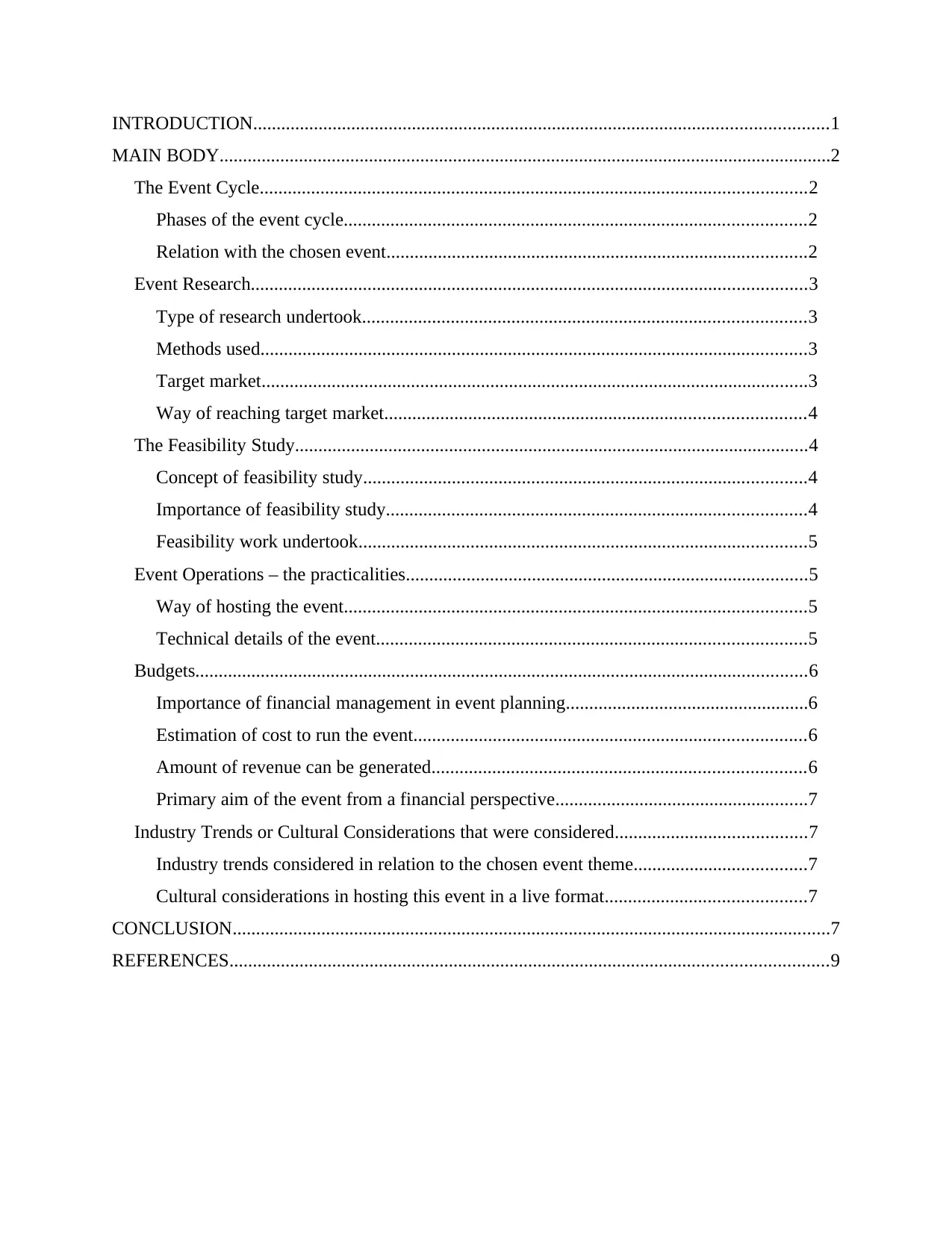
INTRODUCTION...........................................................................................................................1
MAIN BODY...................................................................................................................................2
The Event Cycle.....................................................................................................................2
Phases of the event cycle...................................................................................................2
Relation with the chosen event..........................................................................................2
Event Research.......................................................................................................................3
Type of research undertook...............................................................................................3
Methods used.....................................................................................................................3
Target market.....................................................................................................................3
Way of reaching target market..........................................................................................4
The Feasibility Study..............................................................................................................4
Concept of feasibility study...............................................................................................4
Importance of feasibility study..........................................................................................4
Feasibility work undertook................................................................................................5
Event Operations – the practicalities......................................................................................5
Way of hosting the event...................................................................................................5
Technical details of the event............................................................................................5
Budgets...................................................................................................................................6
Importance of financial management in event planning....................................................6
Estimation of cost to run the event....................................................................................6
Amount of revenue can be generated................................................................................6
Primary aim of the event from a financial perspective......................................................7
Industry Trends or Cultural Considerations that were considered.........................................7
Industry trends considered in relation to the chosen event theme.....................................7
Cultural considerations in hosting this event in a live format...........................................7
CONCLUSION................................................................................................................................7
REFERENCES................................................................................................................................9
MAIN BODY...................................................................................................................................2
The Event Cycle.....................................................................................................................2
Phases of the event cycle...................................................................................................2
Relation with the chosen event..........................................................................................2
Event Research.......................................................................................................................3
Type of research undertook...............................................................................................3
Methods used.....................................................................................................................3
Target market.....................................................................................................................3
Way of reaching target market..........................................................................................4
The Feasibility Study..............................................................................................................4
Concept of feasibility study...............................................................................................4
Importance of feasibility study..........................................................................................4
Feasibility work undertook................................................................................................5
Event Operations – the practicalities......................................................................................5
Way of hosting the event...................................................................................................5
Technical details of the event............................................................................................5
Budgets...................................................................................................................................6
Importance of financial management in event planning....................................................6
Estimation of cost to run the event....................................................................................6
Amount of revenue can be generated................................................................................6
Primary aim of the event from a financial perspective......................................................7
Industry Trends or Cultural Considerations that were considered.........................................7
Industry trends considered in relation to the chosen event theme.....................................7
Cultural considerations in hosting this event in a live format...........................................7
CONCLUSION................................................................................................................................7
REFERENCES................................................................................................................................9
Paraphrase This Document
Need a fresh take? Get an instant paraphrase of this document with our AI Paraphraser
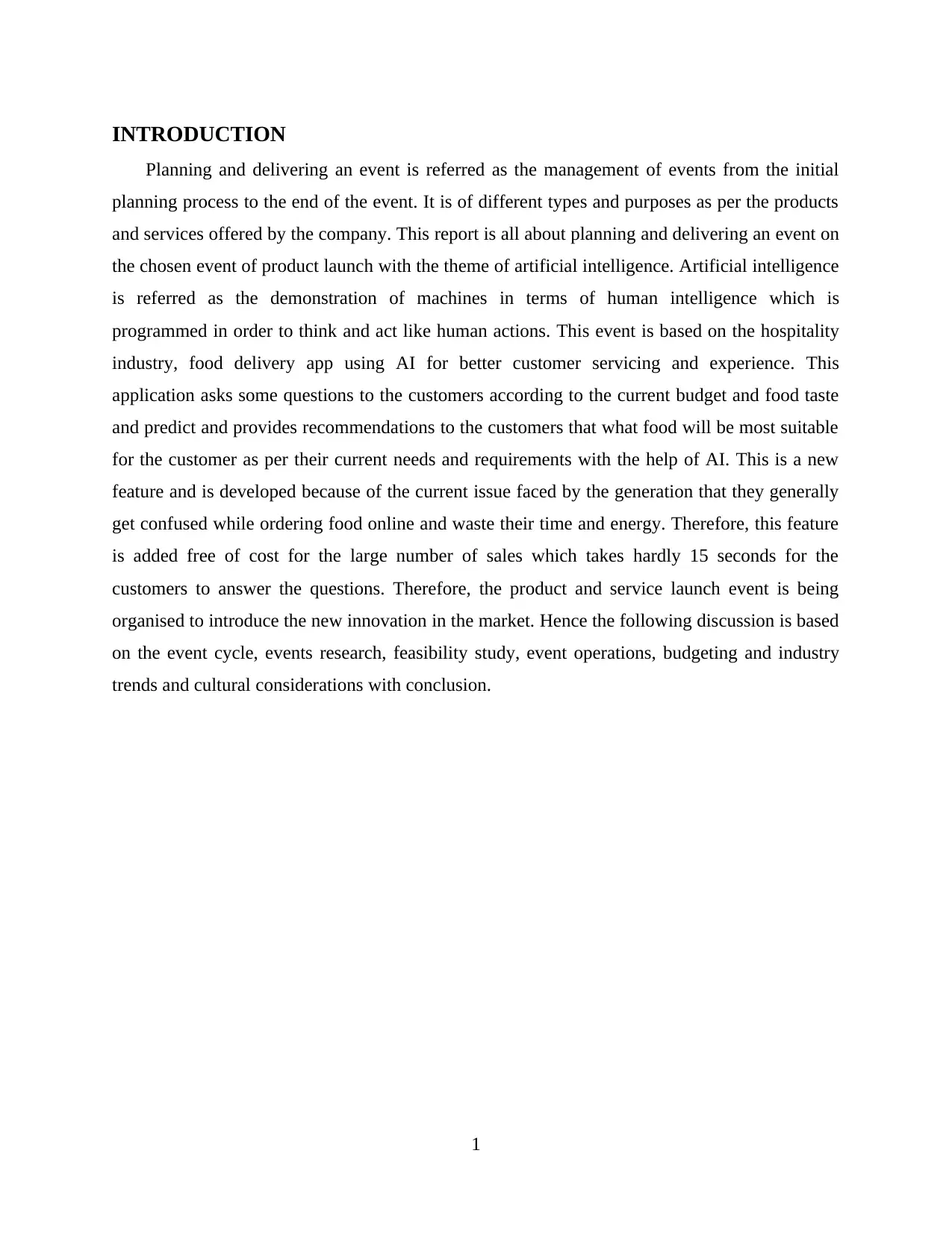
INTRODUCTION
Planning and delivering an event is referred as the management of events from the initial
planning process to the end of the event. It is of different types and purposes as per the products
and services offered by the company. This report is all about planning and delivering an event on
the chosen event of product launch with the theme of artificial intelligence. Artificial intelligence
is referred as the demonstration of machines in terms of human intelligence which is
programmed in order to think and act like human actions. This event is based on the hospitality
industry, food delivery app using AI for better customer servicing and experience. This
application asks some questions to the customers according to the current budget and food taste
and predict and provides recommendations to the customers that what food will be most suitable
for the customer as per their current needs and requirements with the help of AI. This is a new
feature and is developed because of the current issue faced by the generation that they generally
get confused while ordering food online and waste their time and energy. Therefore, this feature
is added free of cost for the large number of sales which takes hardly 15 seconds for the
customers to answer the questions. Therefore, the product and service launch event is being
organised to introduce the new innovation in the market. Hence the following discussion is based
on the event cycle, events research, feasibility study, event operations, budgeting and industry
trends and cultural considerations with conclusion.
1
Planning and delivering an event is referred as the management of events from the initial
planning process to the end of the event. It is of different types and purposes as per the products
and services offered by the company. This report is all about planning and delivering an event on
the chosen event of product launch with the theme of artificial intelligence. Artificial intelligence
is referred as the demonstration of machines in terms of human intelligence which is
programmed in order to think and act like human actions. This event is based on the hospitality
industry, food delivery app using AI for better customer servicing and experience. This
application asks some questions to the customers according to the current budget and food taste
and predict and provides recommendations to the customers that what food will be most suitable
for the customer as per their current needs and requirements with the help of AI. This is a new
feature and is developed because of the current issue faced by the generation that they generally
get confused while ordering food online and waste their time and energy. Therefore, this feature
is added free of cost for the large number of sales which takes hardly 15 seconds for the
customers to answer the questions. Therefore, the product and service launch event is being
organised to introduce the new innovation in the market. Hence the following discussion is based
on the event cycle, events research, feasibility study, event operations, budgeting and industry
trends and cultural considerations with conclusion.
1
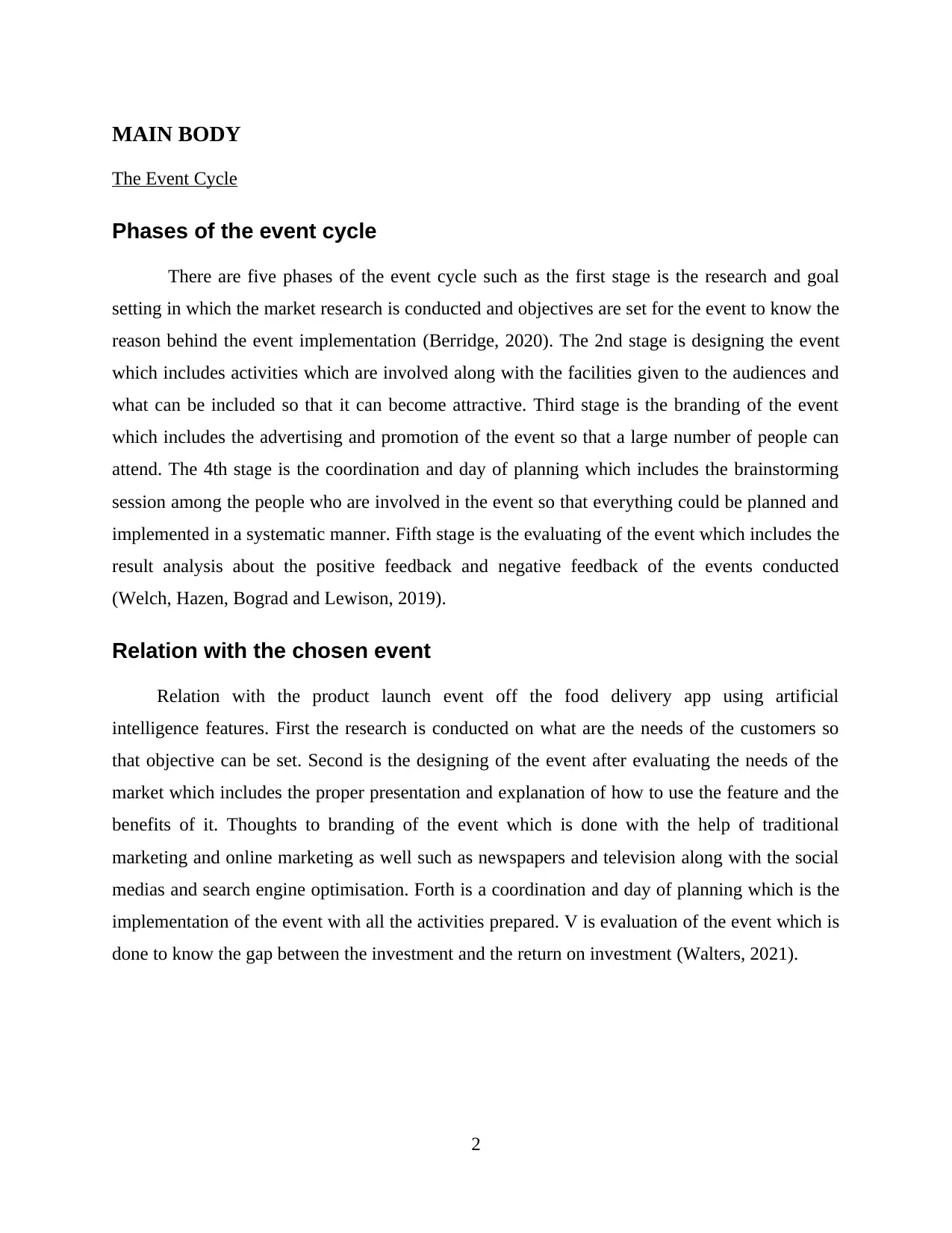
MAIN BODY
The Event Cycle
Phases of the event cycle
There are five phases of the event cycle such as the first stage is the research and goal
setting in which the market research is conducted and objectives are set for the event to know the
reason behind the event implementation (Berridge, 2020). The 2nd stage is designing the event
which includes activities which are involved along with the facilities given to the audiences and
what can be included so that it can become attractive. Third stage is the branding of the event
which includes the advertising and promotion of the event so that a large number of people can
attend. The 4th stage is the coordination and day of planning which includes the brainstorming
session among the people who are involved in the event so that everything could be planned and
implemented in a systematic manner. Fifth stage is the evaluating of the event which includes the
result analysis about the positive feedback and negative feedback of the events conducted
(Welch, Hazen, Bograd and Lewison, 2019).
Relation with the chosen event
Relation with the product launch event off the food delivery app using artificial
intelligence features. First the research is conducted on what are the needs of the customers so
that objective can be set. Second is the designing of the event after evaluating the needs of the
market which includes the proper presentation and explanation of how to use the feature and the
benefits of it. Thoughts to branding of the event which is done with the help of traditional
marketing and online marketing as well such as newspapers and television along with the social
medias and search engine optimisation. Forth is a coordination and day of planning which is the
implementation of the event with all the activities prepared. V is evaluation of the event which is
done to know the gap between the investment and the return on investment (Walters, 2021).
2
The Event Cycle
Phases of the event cycle
There are five phases of the event cycle such as the first stage is the research and goal
setting in which the market research is conducted and objectives are set for the event to know the
reason behind the event implementation (Berridge, 2020). The 2nd stage is designing the event
which includes activities which are involved along with the facilities given to the audiences and
what can be included so that it can become attractive. Third stage is the branding of the event
which includes the advertising and promotion of the event so that a large number of people can
attend. The 4th stage is the coordination and day of planning which includes the brainstorming
session among the people who are involved in the event so that everything could be planned and
implemented in a systematic manner. Fifth stage is the evaluating of the event which includes the
result analysis about the positive feedback and negative feedback of the events conducted
(Welch, Hazen, Bograd and Lewison, 2019).
Relation with the chosen event
Relation with the product launch event off the food delivery app using artificial
intelligence features. First the research is conducted on what are the needs of the customers so
that objective can be set. Second is the designing of the event after evaluating the needs of the
market which includes the proper presentation and explanation of how to use the feature and the
benefits of it. Thoughts to branding of the event which is done with the help of traditional
marketing and online marketing as well such as newspapers and television along with the social
medias and search engine optimisation. Forth is a coordination and day of planning which is the
implementation of the event with all the activities prepared. V is evaluation of the event which is
done to know the gap between the investment and the return on investment (Walters, 2021).
2
⊘ This is a preview!⊘
Do you want full access?
Subscribe today to unlock all pages.

Trusted by 1+ million students worldwide
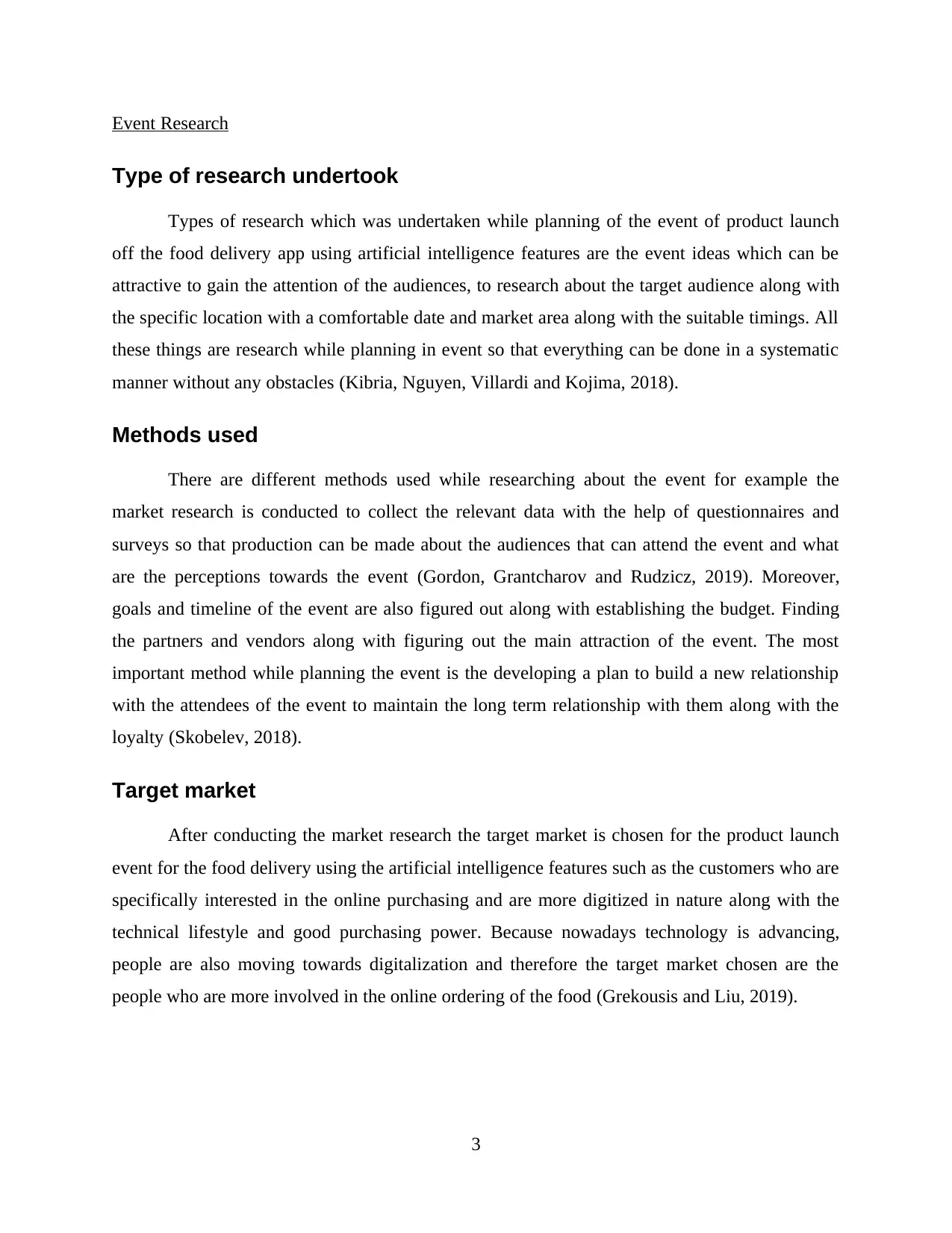
Event Research
Type of research undertook
Types of research which was undertaken while planning of the event of product launch
off the food delivery app using artificial intelligence features are the event ideas which can be
attractive to gain the attention of the audiences, to research about the target audience along with
the specific location with a comfortable date and market area along with the suitable timings. All
these things are research while planning in event so that everything can be done in a systematic
manner without any obstacles (Kibria, Nguyen, Villardi and Kojima, 2018).
Methods used
There are different methods used while researching about the event for example the
market research is conducted to collect the relevant data with the help of questionnaires and
surveys so that production can be made about the audiences that can attend the event and what
are the perceptions towards the event (Gordon, Grantcharov and Rudzicz, 2019). Moreover,
goals and timeline of the event are also figured out along with establishing the budget. Finding
the partners and vendors along with figuring out the main attraction of the event. The most
important method while planning the event is the developing a plan to build a new relationship
with the attendees of the event to maintain the long term relationship with them along with the
loyalty (Skobelev, 2018).
Target market
After conducting the market research the target market is chosen for the product launch
event for the food delivery using the artificial intelligence features such as the customers who are
specifically interested in the online purchasing and are more digitized in nature along with the
technical lifestyle and good purchasing power. Because nowadays technology is advancing,
people are also moving towards digitalization and therefore the target market chosen are the
people who are more involved in the online ordering of the food (Grekousis and Liu, 2019).
3
Type of research undertook
Types of research which was undertaken while planning of the event of product launch
off the food delivery app using artificial intelligence features are the event ideas which can be
attractive to gain the attention of the audiences, to research about the target audience along with
the specific location with a comfortable date and market area along with the suitable timings. All
these things are research while planning in event so that everything can be done in a systematic
manner without any obstacles (Kibria, Nguyen, Villardi and Kojima, 2018).
Methods used
There are different methods used while researching about the event for example the
market research is conducted to collect the relevant data with the help of questionnaires and
surveys so that production can be made about the audiences that can attend the event and what
are the perceptions towards the event (Gordon, Grantcharov and Rudzicz, 2019). Moreover,
goals and timeline of the event are also figured out along with establishing the budget. Finding
the partners and vendors along with figuring out the main attraction of the event. The most
important method while planning the event is the developing a plan to build a new relationship
with the attendees of the event to maintain the long term relationship with them along with the
loyalty (Skobelev, 2018).
Target market
After conducting the market research the target market is chosen for the product launch
event for the food delivery using the artificial intelligence features such as the customers who are
specifically interested in the online purchasing and are more digitized in nature along with the
technical lifestyle and good purchasing power. Because nowadays technology is advancing,
people are also moving towards digitalization and therefore the target market chosen are the
people who are more involved in the online ordering of the food (Grekousis and Liu, 2019).
3
Paraphrase This Document
Need a fresh take? Get an instant paraphrase of this document with our AI Paraphraser
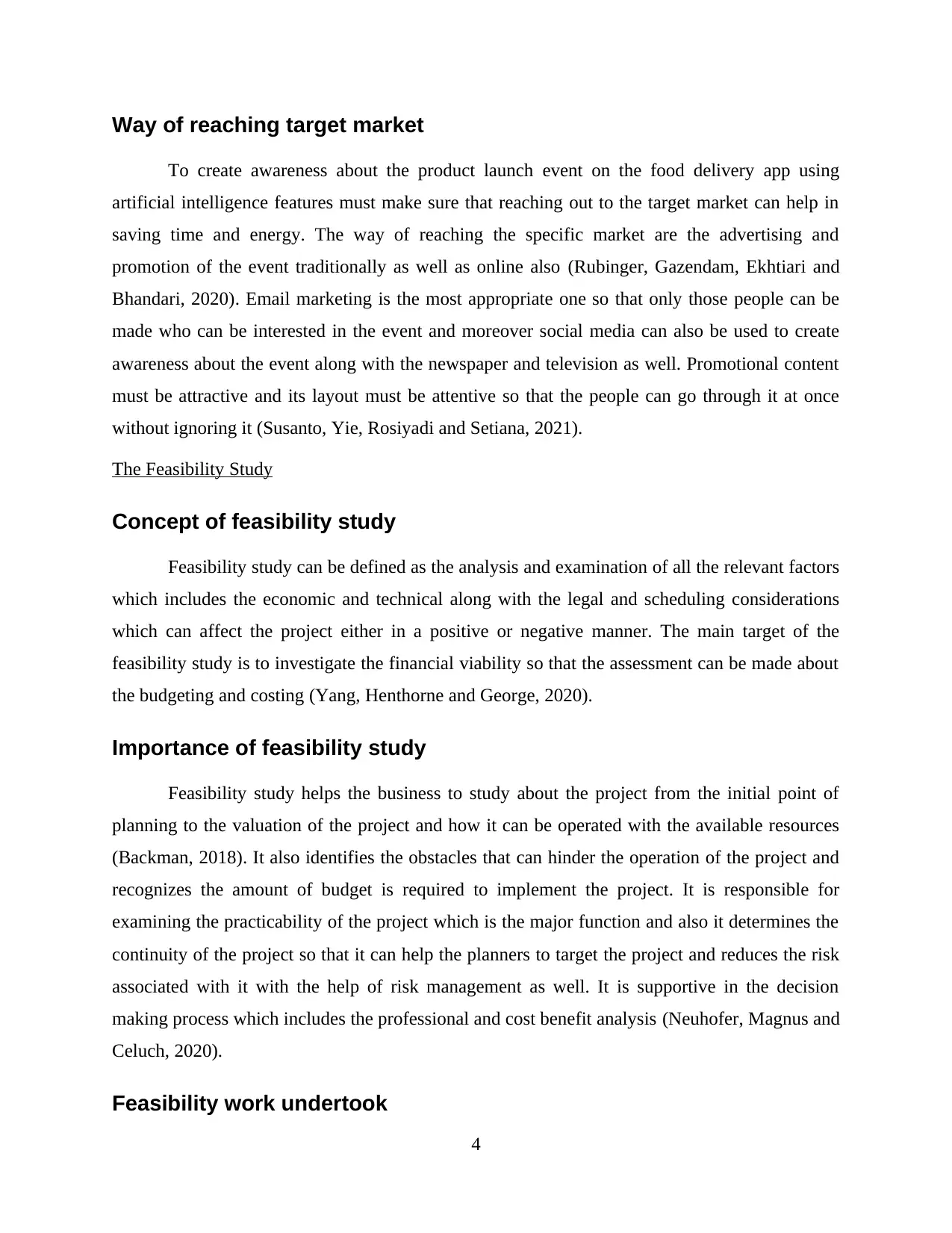
Way of reaching target market
To create awareness about the product launch event on the food delivery app using
artificial intelligence features must make sure that reaching out to the target market can help in
saving time and energy. The way of reaching the specific market are the advertising and
promotion of the event traditionally as well as online also (Rubinger, Gazendam, Ekhtiari and
Bhandari, 2020). Email marketing is the most appropriate one so that only those people can be
made who can be interested in the event and moreover social media can also be used to create
awareness about the event along with the newspaper and television as well. Promotional content
must be attractive and its layout must be attentive so that the people can go through it at once
without ignoring it (Susanto, Yie, Rosiyadi and Setiana, 2021).
The Feasibility Study
Concept of feasibility study
Feasibility study can be defined as the analysis and examination of all the relevant factors
which includes the economic and technical along with the legal and scheduling considerations
which can affect the project either in a positive or negative manner. The main target of the
feasibility study is to investigate the financial viability so that the assessment can be made about
the budgeting and costing (Yang, Henthorne and George, 2020).
Importance of feasibility study
Feasibility study helps the business to study about the project from the initial point of
planning to the valuation of the project and how it can be operated with the available resources
(Backman, 2018). It also identifies the obstacles that can hinder the operation of the project and
recognizes the amount of budget is required to implement the project. It is responsible for
examining the practicability of the project which is the major function and also it determines the
continuity of the project so that it can help the planners to target the project and reduces the risk
associated with it with the help of risk management as well. It is supportive in the decision
making process which includes the professional and cost benefit analysis (Neuhofer, Magnus and
Celuch, 2020).
Feasibility work undertook
4
To create awareness about the product launch event on the food delivery app using
artificial intelligence features must make sure that reaching out to the target market can help in
saving time and energy. The way of reaching the specific market are the advertising and
promotion of the event traditionally as well as online also (Rubinger, Gazendam, Ekhtiari and
Bhandari, 2020). Email marketing is the most appropriate one so that only those people can be
made who can be interested in the event and moreover social media can also be used to create
awareness about the event along with the newspaper and television as well. Promotional content
must be attractive and its layout must be attentive so that the people can go through it at once
without ignoring it (Susanto, Yie, Rosiyadi and Setiana, 2021).
The Feasibility Study
Concept of feasibility study
Feasibility study can be defined as the analysis and examination of all the relevant factors
which includes the economic and technical along with the legal and scheduling considerations
which can affect the project either in a positive or negative manner. The main target of the
feasibility study is to investigate the financial viability so that the assessment can be made about
the budgeting and costing (Yang, Henthorne and George, 2020).
Importance of feasibility study
Feasibility study helps the business to study about the project from the initial point of
planning to the valuation of the project and how it can be operated with the available resources
(Backman, 2018). It also identifies the obstacles that can hinder the operation of the project and
recognizes the amount of budget is required to implement the project. It is responsible for
examining the practicability of the project which is the major function and also it determines the
continuity of the project so that it can help the planners to target the project and reduces the risk
associated with it with the help of risk management as well. It is supportive in the decision
making process which includes the professional and cost benefit analysis (Neuhofer, Magnus and
Celuch, 2020).
Feasibility work undertook
4
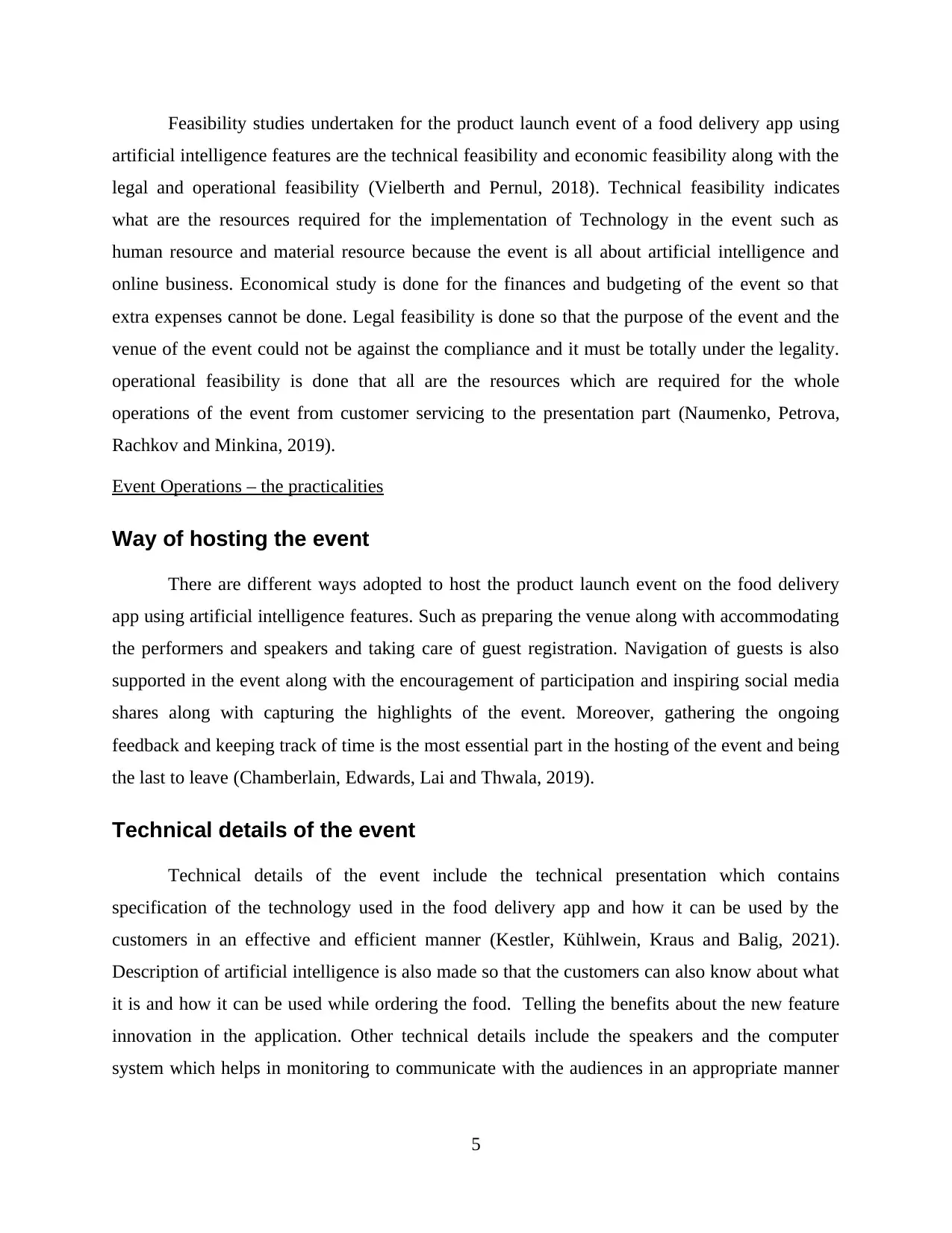
Feasibility studies undertaken for the product launch event of a food delivery app using
artificial intelligence features are the technical feasibility and economic feasibility along with the
legal and operational feasibility (Vielberth and Pernul, 2018). Technical feasibility indicates
what are the resources required for the implementation of Technology in the event such as
human resource and material resource because the event is all about artificial intelligence and
online business. Economical study is done for the finances and budgeting of the event so that
extra expenses cannot be done. Legal feasibility is done so that the purpose of the event and the
venue of the event could not be against the compliance and it must be totally under the legality.
operational feasibility is done that all are the resources which are required for the whole
operations of the event from customer servicing to the presentation part (Naumenko, Petrova,
Rachkov and Minkina, 2019).
Event Operations – the practicalities
Way of hosting the event
There are different ways adopted to host the product launch event on the food delivery
app using artificial intelligence features. Such as preparing the venue along with accommodating
the performers and speakers and taking care of guest registration. Navigation of guests is also
supported in the event along with the encouragement of participation and inspiring social media
shares along with capturing the highlights of the event. Moreover, gathering the ongoing
feedback and keeping track of time is the most essential part in the hosting of the event and being
the last to leave (Chamberlain, Edwards, Lai and Thwala, 2019).
Technical details of the event
Technical details of the event include the technical presentation which contains
specification of the technology used in the food delivery app and how it can be used by the
customers in an effective and efficient manner (Kestler, Kühlwein, Kraus and Balig, 2021).
Description of artificial intelligence is also made so that the customers can also know about what
it is and how it can be used while ordering the food. Telling the benefits about the new feature
innovation in the application. Other technical details include the speakers and the computer
system which helps in monitoring to communicate with the audiences in an appropriate manner
5
artificial intelligence features are the technical feasibility and economic feasibility along with the
legal and operational feasibility (Vielberth and Pernul, 2018). Technical feasibility indicates
what are the resources required for the implementation of Technology in the event such as
human resource and material resource because the event is all about artificial intelligence and
online business. Economical study is done for the finances and budgeting of the event so that
extra expenses cannot be done. Legal feasibility is done so that the purpose of the event and the
venue of the event could not be against the compliance and it must be totally under the legality.
operational feasibility is done that all are the resources which are required for the whole
operations of the event from customer servicing to the presentation part (Naumenko, Petrova,
Rachkov and Minkina, 2019).
Event Operations – the practicalities
Way of hosting the event
There are different ways adopted to host the product launch event on the food delivery
app using artificial intelligence features. Such as preparing the venue along with accommodating
the performers and speakers and taking care of guest registration. Navigation of guests is also
supported in the event along with the encouragement of participation and inspiring social media
shares along with capturing the highlights of the event. Moreover, gathering the ongoing
feedback and keeping track of time is the most essential part in the hosting of the event and being
the last to leave (Chamberlain, Edwards, Lai and Thwala, 2019).
Technical details of the event
Technical details of the event include the technical presentation which contains
specification of the technology used in the food delivery app and how it can be used by the
customers in an effective and efficient manner (Kestler, Kühlwein, Kraus and Balig, 2021).
Description of artificial intelligence is also made so that the customers can also know about what
it is and how it can be used while ordering the food. Telling the benefits about the new feature
innovation in the application. Other technical details include the speakers and the computer
system which helps in monitoring to communicate with the audiences in an appropriate manner
5
⊘ This is a preview!⊘
Do you want full access?
Subscribe today to unlock all pages.

Trusted by 1+ million students worldwide
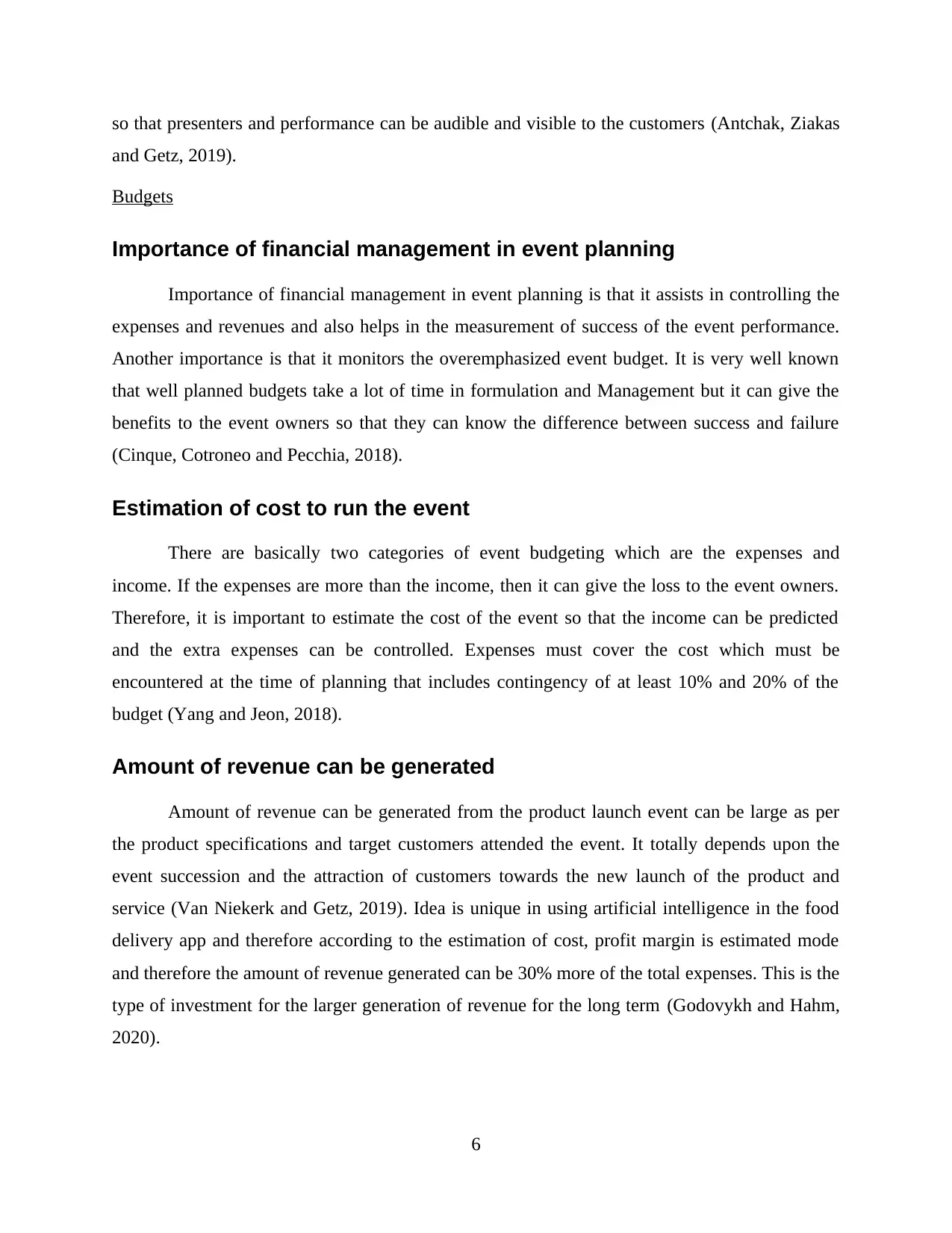
so that presenters and performance can be audible and visible to the customers (Antchak, Ziakas
and Getz, 2019).
Budgets
Importance of financial management in event planning
Importance of financial management in event planning is that it assists in controlling the
expenses and revenues and also helps in the measurement of success of the event performance.
Another importance is that it monitors the overemphasized event budget. It is very well known
that well planned budgets take a lot of time in formulation and Management but it can give the
benefits to the event owners so that they can know the difference between success and failure
(Cinque, Cotroneo and Pecchia, 2018).
Estimation of cost to run the event
There are basically two categories of event budgeting which are the expenses and
income. If the expenses are more than the income, then it can give the loss to the event owners.
Therefore, it is important to estimate the cost of the event so that the income can be predicted
and the extra expenses can be controlled. Expenses must cover the cost which must be
encountered at the time of planning that includes contingency of at least 10% and 20% of the
budget (Yang and Jeon, 2018).
Amount of revenue can be generated
Amount of revenue can be generated from the product launch event can be large as per
the product specifications and target customers attended the event. It totally depends upon the
event succession and the attraction of customers towards the new launch of the product and
service (Van Niekerk and Getz, 2019). Idea is unique in using artificial intelligence in the food
delivery app and therefore according to the estimation of cost, profit margin is estimated mode
and therefore the amount of revenue generated can be 30% more of the total expenses. This is the
type of investment for the larger generation of revenue for the long term (Godovykh and Hahm,
2020).
6
and Getz, 2019).
Budgets
Importance of financial management in event planning
Importance of financial management in event planning is that it assists in controlling the
expenses and revenues and also helps in the measurement of success of the event performance.
Another importance is that it monitors the overemphasized event budget. It is very well known
that well planned budgets take a lot of time in formulation and Management but it can give the
benefits to the event owners so that they can know the difference between success and failure
(Cinque, Cotroneo and Pecchia, 2018).
Estimation of cost to run the event
There are basically two categories of event budgeting which are the expenses and
income. If the expenses are more than the income, then it can give the loss to the event owners.
Therefore, it is important to estimate the cost of the event so that the income can be predicted
and the extra expenses can be controlled. Expenses must cover the cost which must be
encountered at the time of planning that includes contingency of at least 10% and 20% of the
budget (Yang and Jeon, 2018).
Amount of revenue can be generated
Amount of revenue can be generated from the product launch event can be large as per
the product specifications and target customers attended the event. It totally depends upon the
event succession and the attraction of customers towards the new launch of the product and
service (Van Niekerk and Getz, 2019). Idea is unique in using artificial intelligence in the food
delivery app and therefore according to the estimation of cost, profit margin is estimated mode
and therefore the amount of revenue generated can be 30% more of the total expenses. This is the
type of investment for the larger generation of revenue for the long term (Godovykh and Hahm,
2020).
6
Paraphrase This Document
Need a fresh take? Get an instant paraphrase of this document with our AI Paraphraser
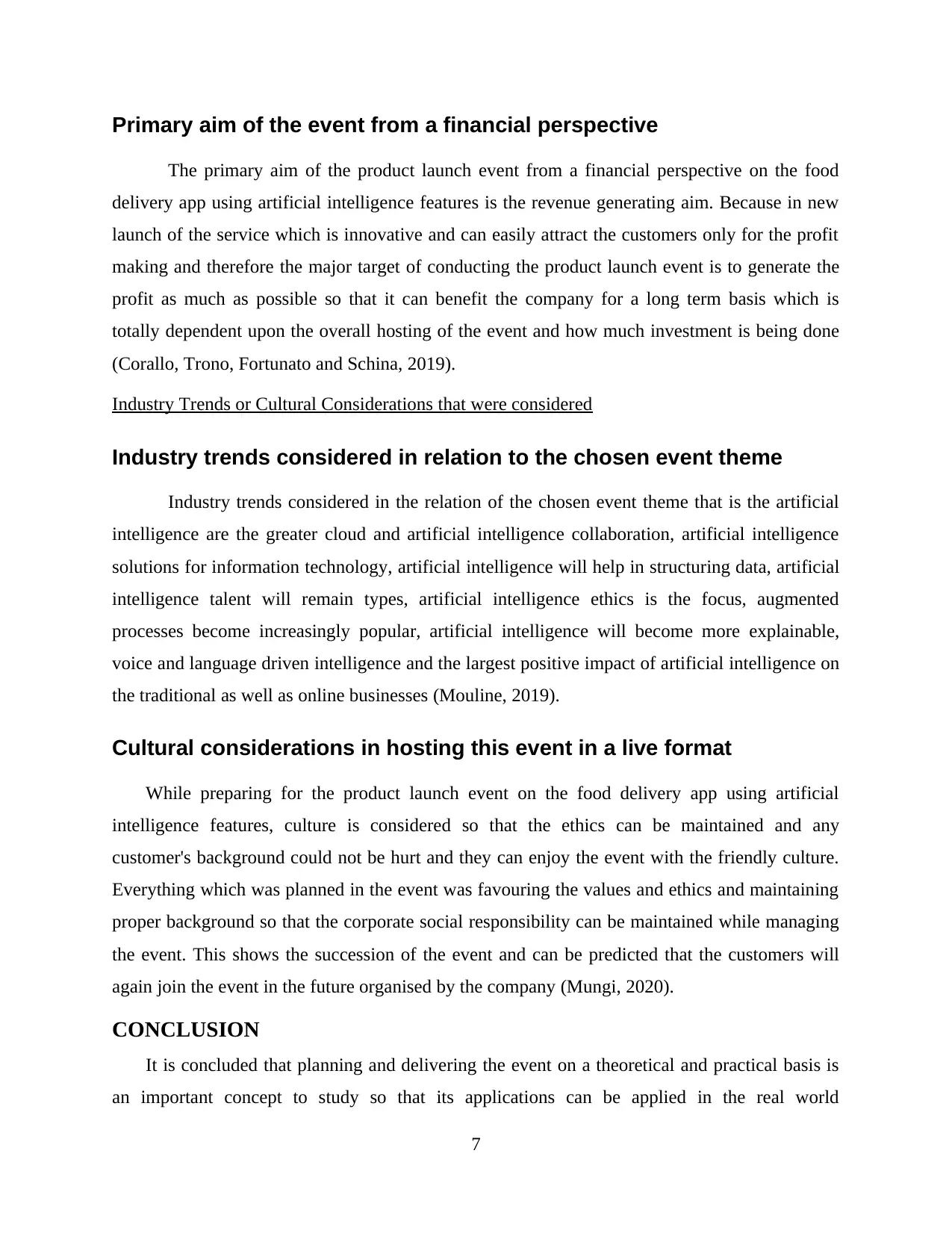
Primary aim of the event from a financial perspective
The primary aim of the product launch event from a financial perspective on the food
delivery app using artificial intelligence features is the revenue generating aim. Because in new
launch of the service which is innovative and can easily attract the customers only for the profit
making and therefore the major target of conducting the product launch event is to generate the
profit as much as possible so that it can benefit the company for a long term basis which is
totally dependent upon the overall hosting of the event and how much investment is being done
(Corallo, Trono, Fortunato and Schina, 2019).
Industry Trends or Cultural Considerations that were considered
Industry trends considered in relation to the chosen event theme
Industry trends considered in the relation of the chosen event theme that is the artificial
intelligence are the greater cloud and artificial intelligence collaboration, artificial intelligence
solutions for information technology, artificial intelligence will help in structuring data, artificial
intelligence talent will remain types, artificial intelligence ethics is the focus, augmented
processes become increasingly popular, artificial intelligence will become more explainable,
voice and language driven intelligence and the largest positive impact of artificial intelligence on
the traditional as well as online businesses (Mouline, 2019).
Cultural considerations in hosting this event in a live format
While preparing for the product launch event on the food delivery app using artificial
intelligence features, culture is considered so that the ethics can be maintained and any
customer's background could not be hurt and they can enjoy the event with the friendly culture.
Everything which was planned in the event was favouring the values and ethics and maintaining
proper background so that the corporate social responsibility can be maintained while managing
the event. This shows the succession of the event and can be predicted that the customers will
again join the event in the future organised by the company (Mungi, 2020).
CONCLUSION
It is concluded that planning and delivering the event on a theoretical and practical basis is
an important concept to study so that its applications can be applied in the real world
7
The primary aim of the product launch event from a financial perspective on the food
delivery app using artificial intelligence features is the revenue generating aim. Because in new
launch of the service which is innovative and can easily attract the customers only for the profit
making and therefore the major target of conducting the product launch event is to generate the
profit as much as possible so that it can benefit the company for a long term basis which is
totally dependent upon the overall hosting of the event and how much investment is being done
(Corallo, Trono, Fortunato and Schina, 2019).
Industry Trends or Cultural Considerations that were considered
Industry trends considered in relation to the chosen event theme
Industry trends considered in the relation of the chosen event theme that is the artificial
intelligence are the greater cloud and artificial intelligence collaboration, artificial intelligence
solutions for information technology, artificial intelligence will help in structuring data, artificial
intelligence talent will remain types, artificial intelligence ethics is the focus, augmented
processes become increasingly popular, artificial intelligence will become more explainable,
voice and language driven intelligence and the largest positive impact of artificial intelligence on
the traditional as well as online businesses (Mouline, 2019).
Cultural considerations in hosting this event in a live format
While preparing for the product launch event on the food delivery app using artificial
intelligence features, culture is considered so that the ethics can be maintained and any
customer's background could not be hurt and they can enjoy the event with the friendly culture.
Everything which was planned in the event was favouring the values and ethics and maintaining
proper background so that the corporate social responsibility can be maintained while managing
the event. This shows the succession of the event and can be predicted that the customers will
again join the event in the future organised by the company (Mungi, 2020).
CONCLUSION
It is concluded that planning and delivering the event on a theoretical and practical basis is
an important concept to study so that its applications can be applied in the real world
7
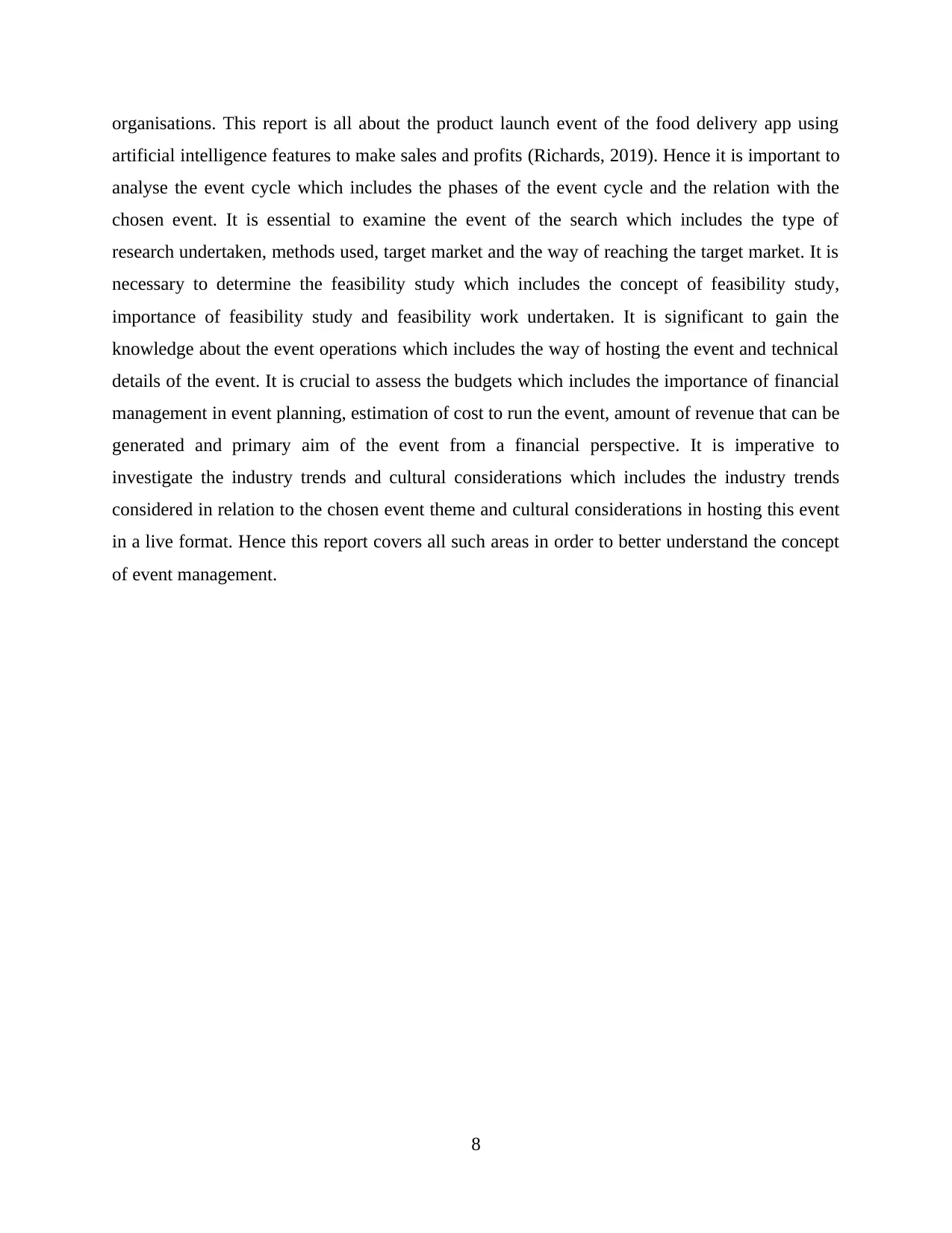
organisations. This report is all about the product launch event of the food delivery app using
artificial intelligence features to make sales and profits (Richards, 2019). Hence it is important to
analyse the event cycle which includes the phases of the event cycle and the relation with the
chosen event. It is essential to examine the event of the search which includes the type of
research undertaken, methods used, target market and the way of reaching the target market. It is
necessary to determine the feasibility study which includes the concept of feasibility study,
importance of feasibility study and feasibility work undertaken. It is significant to gain the
knowledge about the event operations which includes the way of hosting the event and technical
details of the event. It is crucial to assess the budgets which includes the importance of financial
management in event planning, estimation of cost to run the event, amount of revenue that can be
generated and primary aim of the event from a financial perspective. It is imperative to
investigate the industry trends and cultural considerations which includes the industry trends
considered in relation to the chosen event theme and cultural considerations in hosting this event
in a live format. Hence this report covers all such areas in order to better understand the concept
of event management.
8
artificial intelligence features to make sales and profits (Richards, 2019). Hence it is important to
analyse the event cycle which includes the phases of the event cycle and the relation with the
chosen event. It is essential to examine the event of the search which includes the type of
research undertaken, methods used, target market and the way of reaching the target market. It is
necessary to determine the feasibility study which includes the concept of feasibility study,
importance of feasibility study and feasibility work undertaken. It is significant to gain the
knowledge about the event operations which includes the way of hosting the event and technical
details of the event. It is crucial to assess the budgets which includes the importance of financial
management in event planning, estimation of cost to run the event, amount of revenue that can be
generated and primary aim of the event from a financial perspective. It is imperative to
investigate the industry trends and cultural considerations which includes the industry trends
considered in relation to the chosen event theme and cultural considerations in hosting this event
in a live format. Hence this report covers all such areas in order to better understand the concept
of event management.
8
⊘ This is a preview!⊘
Do you want full access?
Subscribe today to unlock all pages.

Trusted by 1+ million students worldwide
1 out of 14
Related Documents
Your All-in-One AI-Powered Toolkit for Academic Success.
+13062052269
info@desklib.com
Available 24*7 on WhatsApp / Email
![[object Object]](/_next/static/media/star-bottom.7253800d.svg)
Unlock your academic potential
Copyright © 2020–2026 A2Z Services. All Rights Reserved. Developed and managed by ZUCOL.





